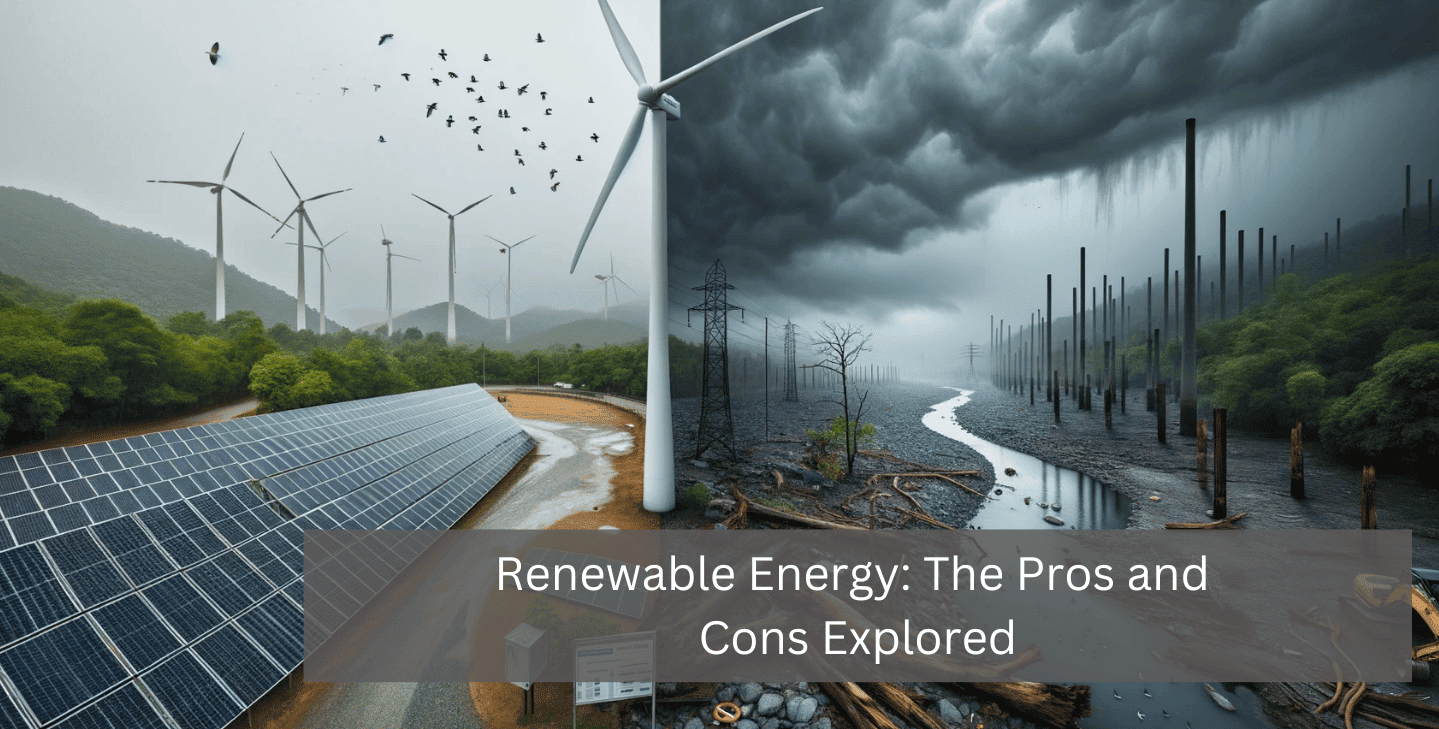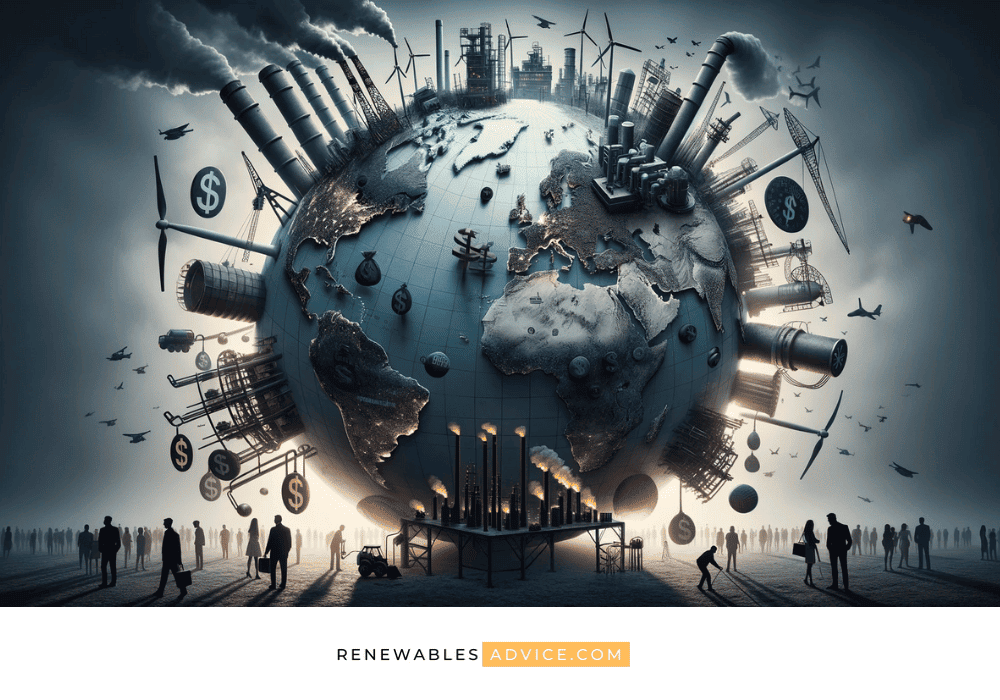Renewable Energy: The Pros and Cons Explored
Renewable Energy: The Pros and Cons Explored
Renewable Energy: The Pros and Cons Explored

In the tapestry of human advancement, where does renewable energy fit in? Allow me to make a case for its significance. As we find ourselves on the brink of a green revolution, the discussion around renewable energy has never been more relevant. Why now though? Why in this era of progress do we still grapple with the age-old question of how to best power our world? Isn't it ironic that while we send rovers to far-off planets, we continue to rely on fossil fuels at home?
If we examine history’s records: from the birth of the steam engine to the discovery of oil, energy has always played a role in its transformation. However, as we look towards the future shouldn't we consider: at what cost? Can we truly advocate for renewables without acknowledging their limitations? Conversely, can we dismiss them without recognising their potential?
The contrast between the promise of cleaner energy and the challenges it presents is striking. As we explore both the advantages and disadvantages of renewable energy, let’s not simply assess its merits alone.
Instead, let's take a voyage where we compare the past and the present and maybe by doing that, we can plan a path towards a future that's more sustainable.
What is Renewable Energy?
Throughout history energy has always played a pivotal role. A vital essence that fuels progress. However, when we speak of "renewable energy", do we truly grasp its meaning? Is it merely a passing fad? Does it signify a shift in our connection with Mother Earth?
Allow me to delve into its profound nature and attempt to persuade you. From the water wheels of the Roman Empire to the windmills scattered across the Dutch countryside, harnessing the forces of nature is not a new concept. Yet in today's world "renewable energy" encompasses more than these examples. It embodies a vision of a world that relies less on resources and instead draws sustenance from the perpetual interplay between sunlight, wind, and water.
Consider this: just as coal and steam powered the Industrial Revolution, are we now standing on the threshold of a Green Revolution fueled by solar panels and wind turbines? The differences may be striking but there are parallels at play. Just like our ancestors looked for ways to power their world, aren't we also compelled to do the same but with a stronger focus on sustainability?
It’s important to question: is renewable energy the solution we've been searching for? Does it come with its set of challenges just like everything else? As we dig deeper into this subject let's not just accept information at face value. Instead let’s critically examine, compare, and think about the implications of a world powered by renewable sources.
What Are the Benefits of Renewable Energy?
The benefits of renewable energy are:
- A Breath of Fresh Air: At the heart of the renewable energy revolution lies a simple truth - cleaner energy sources lead to a reduction in harmful emissions. Remember the smog-filled industrial cities of the 19th century? With renewables, we're charting a course away from that bleak past.
- Economic Renaissance: Think renewables are all about the environment? Think again. The burgeoning green energy sector is a veritable job-creating machine, offering opportunities from engineering to entrepreneurship.
- Inexhaustible Supply: Unlike fossil fuels, the sun and wind aren't going anywhere. Harnessing these eternal forces ensures a consistent energy supply. Why cling to the finite when the infinite beckons?
- Reduced Global Conflict: Ever pondered the geopolitical implications of energy? Oil and gas have, historically, been catalysts for conflict. Transitioning to renewables could herald a more peaceful era. Less "oil wars", more windmill wonders.
- Empowerment of Communities: Let me see if I can persuade you with this - decentralised renewable energy sources empower local communities. No longer beholden to large utility companies, towns and villages can produce their own energy.
- Innovation and Technological Advancements: The push for renewables has sparked a renaissance in energy-related tech. From more efficient solar panels to groundbreaking energy storage solutions, the future looks bright.
- Cost Savings in the Long Run: Initial setup costs might be high, but over time? Renewables prove to be a cost-effective solution. After all, sunlight and wind are free, aren't they?
Does Adopting Renewable Energy Lead to Economic Growth?
Throughout the pages of history, the Industrial Revolution serves as an example of how energy can reshape economies. However, have we ever stopped to think about the renaissance that renewable energy could bring forth? The shift from coal and steam power to wind energy is not only a significant environmental milestone but also an economic transformation.
Firstly let's explore the job market. The renewable sector brimming with opportunities reminds us of the tech boom during the late 20th century. From solar technicians in Arizona to hydroelectric engineers in Norway, green jobs are emerging on a global scale. Yet it's not just about employment; we should also recall the oil crises of the 1970s. Nations dependent on fossil fuel prices faced hardships due to their vulnerability to fluctuations in those prices. Now envision a future where energy's not just clean but also economically stable—a utopia that's indeed within our grasp.
There has been an influx of investments in startups resembling a greener version of the Gold Rush phenomenon. Let's not overlook the long-term cost reductions either; while initial investments might be substantial they promise reduced expenses and increased savings as time goes on.
Transitioning towards renewables is more than a decision—it's an astute economic strategy. Are we prepared to embrace the winds of change that come with this revolution? It's a question we ponder as we contemplate a more prosperous future.
Is Renewable Energy Beneficial for Climate Change Mitigation?
The Industrial Revolution stood as a turning point, but with it came the unintended consequence of accelerated climate change. Fast forward to today, and we find ourselves at another crossroads. Can renewable energy be our saving grace in the battle against this looming crisis?
According to scientists in the MIT Joint Program on the Science and Policy of Global Change, due to no CO2 produced in most types of renewable energy generation, a central role is played in climate change mitigation by renewable energy. But what does this mean in layman's terms? Simply put, renewable energy, coupled with energy efficiency, offers a viable and immediate solution to drastically reduce energy-related CO2 emissions. In essence, it's our ticket to achieving over 90% of the necessary reductions to meet our ambitious climate goals.
What Are the Risks and Disadvantages of Renewable Energy?
Throughout history, our energy choices have left lasting impacts on our planet. Amidst this move towards renewables, there have been many disadvantages discovered:
- Threat to Wildlife: A thought-provoking book titled "Renewable Energy and Wildlife Conservation " published by the Johns Hopkins University Press and The Wildlife Society delves into the effects of energy production on wildlife. It offers insights for those who advocate for a balanced approach to progress.
- Land Use: To generate the volume of energy required to transition to renewable energy as our main source, vast areas of land will be required for wind or solar power generation. Do countries globally have the land available due to increases in population growth and the other uses of the land that may be required instead?
- Economic Implications: New sources of energy have acted as catalysts for growth historically but will renewables follow suit? Some have argued that the unreliability of renewable sources can have implications for our economic development.
- Setup Costs: Renewables are known to have high initial setup costs that may be unaffordable to the average consumer or business.
- Storage Capabilities: As we charge towards a renewable future, do we have the battery storage capacity to capture the energy effectively? Further investment is required to ensure this is the case.
Which Energy Sources Can Be Affected by These Disadvantages?
Unfortunately these disadvantages can have an effect on our renewable energy generation potential. Solar energy for all its sun-kissed promises, is a slave to the whims of sunlight. No sun, no power. Simple, right? And then there's wind energy, dancing to the unpredictable tunes of the breeze. Ever tried flying a kite on a still day? It’s not going to be a successful flight.
Now, geothermal energy, with its steamy allure, seems promising. But here's the catch: it's location-specific. Not everyone has the luxury of living atop a volcanic hotspot. And while biomass energy parades around as a green alternative, it has the potential for pollution.
So, while these energy sources have great potential, they're not without their flaws. But then again, what in this world is perfect? Still, it's essential to know the whole story to be able to progress into renewables in the best possible way.
Why Do Some Regions Resist Adopting Renewable Energy?

Some regions drag their feet when it comes to adopting renewable energy. Economic concerns and vested interests often play a pivotal role. Think about it: why would industries, deeply entrenched in fossil fuels, willingly give up their lucrative ventures? Then there's the issue of infrastructure limitations. Not every region is equipped with the latest technology or the means to overhaul its existing systems. And let's not forget the lack of awareness and education. How can one champion a cause they barely understand? In other words, without proper education, the masses remain in the dark, quite literally. Policy and regulatory challenges can't be ignored and navigating the intricate maze of regulations can be a nightmare for many. Regardless, it's essential to remember what's at stake. Kristalina Georgieva of the International Monetary Fund has stated "The poorest countries face the greatest risks from climate change and require international support to finance adaptation." So, while challenges exist, the need for renewable energy is undeniable and some countries may need help from others to succeed.
Should Developing Countries Prioritise Renewable Energy?
Renewable energy plays a pivotal role in a sustainable reality vision. But there's more to the story. Energy poverty is a real problem with millions still living in darkness, and renewables could be their beacon of hope. With new technology always on the horizon, developing countries can ditch the outdated technologies and leapfrog straight to the cutting-edge in the hope of bringing energy to off-grid locations. And here's the cherry on top: embracing renewables could open the floodgates to international funding and support from places like The World Bank amongst others. There’s a number of factors in play for developing countries in their decision in how and when to go green, and a switch to renewables will have to come at some point as their reliance on fossil fuels diminishes.
How Are LiFePO4 Batteries Advancing the Transition to 100% Renewable Energy?
Transitioning to a 100% renewable future isn’t going to be easy. To achieve this feat, innovation in the energy storage sector is required. Some batteries available today for the bill though: Lithium-iron Phosphate batteries. LiFePO4 batteries aren't your everyday batteries; they're game-changers. First, consider scalability in large renewable energy projects and imagine harnessing the power of the sun on a colossal scale. Now, combine solar power with LiFePO4, and what do you get? A dynamic duo capable of powering entire cities! Reliability in continuous energy supply is the name of the game. Gone are the days of intermittent power and blackouts with LiFePO4 batteries at the helm, we're talking about a seamless, uninterrupted flow of green energy.